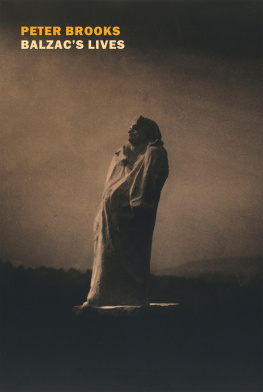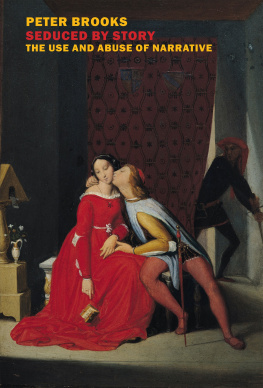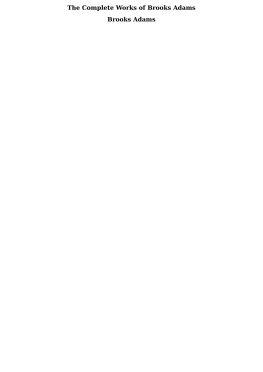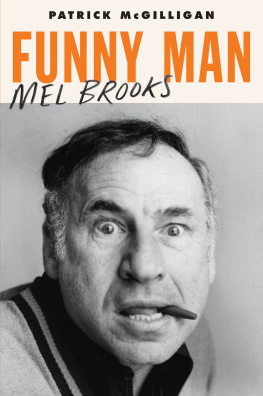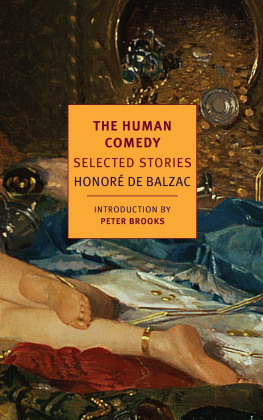Peter Brooks - Balzacs Lives
Here you can read online Peter Brooks - Balzacs Lives full text of the book (entire story) in english for free. Download pdf and epub, get meaning, cover and reviews about this ebook. year: 2020, publisher: New York Review Books, genre: Detective and thriller. Description of the work, (preface) as well as reviews are available. Best literature library LitArk.com created for fans of good reading and offers a wide selection of genres:
Romance novel
Science fiction
Adventure
Detective
Science
History
Home and family
Prose
Art
Politics
Computer
Non-fiction
Religion
Business
Children
Humor
Choose a favorite category and find really read worthwhile books. Enjoy immersion in the world of imagination, feel the emotions of the characters or learn something new for yourself, make an fascinating discovery.
- Book:Balzacs Lives
- Author:
- Publisher:New York Review Books
- Genre:
- Year:2020
- Rating:4 / 5
- Favourites:Add to favourites
- Your mark:
- 80
- 1
- 2
- 3
- 4
- 5
Balzacs Lives: summary, description and annotation
We offer to read an annotation, description, summary or preface (depends on what the author of the book "Balzacs Lives" wrote himself). If you haven't found the necessary information about the book — write in the comments, we will try to find it.
Balzacs Lives — read online for free the complete book (whole text) full work
Below is the text of the book, divided by pages. System saving the place of the last page read, allows you to conveniently read the book "Balzacs Lives" online for free, without having to search again every time where you left off. Put a bookmark, and you can go to the page where you finished reading at any time.
Font size:
Interval:
Bookmark:

Balzacs Lives
PETER BROOKS
 New York Review Books New York
New York Review Books New York
This is a New York Review Book
published by The New York Review of Books
435 Hudson Street, New York, NY 10014
www.nyrb.com
Copyright 2020 by Peter Brooks
All rights reserved.
Cover image: Edward Steichen, Balzac, Towards the Light, Midnight, 1908; image Metropolitan Museum of Art; imagesource: Art Resource, NY
Cover design: Katy Homans
Library of Congress Cataloging-in-Publication Data
Names: Brooks, Peter, 1938 author.
Title: Balzacs lives / by Peter Brooks.
Description: New York : New York Review Books, [2020] | Includes bibliographical references and index.
Identifiers: LCCN 2020016060 (print) | LCCN 2020016061 (ebook) | ISBN 9781681374499 (paperback) | ISBN 9781681374505 (ebook)
Subjects: LCSH: Balzac, Honor de, 17991850Characters. | Balzac, Honor de, 17991850Criticism and interpretation.
Classification: LCC PQ2184.C5 B76 2020 (print) | LCC PQ2184.C5 (ebook) | DDC 843/.7dc23
LC record available at https://lccn.loc.gov/2020016060
LC ebook record available at https://lccn.loc.gov/2020016061
ISBN 978-1-68137-450-5
v1.0
For a complete list of titles, visit www.nyrb.com or write to:
Catalog Requests, NYRB, 435 Hudson Street, New York, NY 10014
As for his eyes, there was never anything like them. They had inconceivable light, life, magnetism.... They were eyes to make an eagle blink, eyes to read through walls and rib cages, eyes to stop a wild beast in its tracks, eyes of a sovereign, of a seer, of a lion tamer.
T HOPHILE G AUTIER , on Balzac
T HIS IS NOT A BIOGRAPHYITS an antibiography or maybe more accurately an oblique biography of the great novelist Honor de Balzac. Balzacs life has often been told, but its less compelling than Balzacs lives, the extraordinary, extravagant, profligate creation of the well over two thousand fictional beings who people his novels. Thats where we find the truth of his time and of his imaginative life.
Oscar Wilde noted in one of his truest paradoxes that the nineteenth century as we know it is largely Balzacs invention.
Its notable that nearly every time one of these characters enters one of the many tales that make up The Human Comedy, he or she is given a biography, sometimes a few lines, in the case of the minor figures, but often several paragraphs or even pages. Balzac needs to situate his people; showing how their personal histories are related to the history of the nation at a given moment is crucial. At times, it is astonishing to find the movement of the narrative arrested for the backstory of a new character; we may even be annoyed at the delay, until we come to realize that the new characters story is indispensable to the narrative as a whole. As in collections of interconnected tales such as The Decameron and The Arabian Nights (the latter being one of Balzacs touchstones) each new person is defined as the bearer of a storythey are people-narratives. Balzac cant conceive of representing the world other than through these people-narratives: to understand contemporary France is to tell the story of all its inhabitants, to rival, as he put it, the civil registry. The Human Comedy resembles the office of the census. But much more fun.
Balzac proclaimed himself a political conservative in reaction to an era of unregulated change, in which the individual ego seemed to have become the sole measure of things. His nostalgia for a past organic society where people knew their place and social rank was evident in dress and manner is matched by his fascination with the new possibilities for each individual to forge a unique destiny. The growing city of Paris, the increase in social mobility, and the ambitions unleashed by capitalism and nascent democracy all called for a new semiotics of modern life, new ways to read who people are, what their clothes and accessories and ways of walking and speaking say about where they come from and where they are going. The sum of those invented destinies is The Human Comedy.
He was born in 1799the year Napoleon Bonaparte seized power to put an end to the French Revolutionas Honor Balzac to a family only one generation removed from peasant farmers named Balssa. The pseudo-aristocratic de was added later. His father rose to a middling rank in the postrevolutionary bureaucracy, and that took the family from its native Tours to Paris in 1814. Honor studied law but yearned for literature. He wheedled his family to grant him two years to succeed as a writer. His first efforts were failures. During the 1820s, though, he managed to publish a number of Gothic and adventure novels, signed with pseudonyms since he knew they were not what he wanted to be known for (he later called them literary slop, yet also republished them to make money). The first novel signed with his name came in 1829. Then during the 1830s he became the Balzac that we know; he published a series of powerful novels and then conceived of making them the building blocks of a larger ensemble not yet known as The Human Comedy. The July Revolution of 1830, which sent the last Bourbon monarch, Charles X, into exile and enthroned the Citizen King Louis-Philippe (from the younger branch of the royal family), confirmed Balzac in the view that he was living in at a moment of social chaos, with authority and traditional social roles in deplorable decline. Most of his work was composed during the 1830s and 1840s but is set during the 1820s, during the Restoration following the fall of Napoleon. In other words, he is writing about a period that has already endedin the July Revolution that brought the bourgeois monarchy to power.
This retrospective view of society allowed him to become the first writer truly to seize the meaning of the emergent modern world, its nascent capitalism, its valuation of money above all else, its competition for social and political prominence, promoting the individual above social cohesion. He saw also the new importance of the city as provincials streamed to it, either to work in bottom-level jobs and become the urban proletariat or, like his ambitious young men (and some women also), to seek to conquer and to dominate the social order. Balzac became a successful writer, read throughout Europe, though the more he wrote and published, and lived the Parisian existence he dreamt of, the more he went into debt. He traveled, had a number of liaisons (and at least one child we can be sure of), and eventually married Evelina Hanska, the Polish countess who nearly twenty years earlier had sent him a fan letter. He died in 1850, just after he returned with her to his new house in Paris. His uncompleted literary monument contained some ninety novels and tales.
Henry James called Balzac the father of us all, the writer one must study if the novel is to recover its wasted heritage.possibly a complete edition of The Human Comedy as translated by Katharine Prescott Wormeley, who lived in Newport, Rhode Island, and spent summers not far from William James in Jackson, New Hampshire, and worked her way through all of Balzacs novels and tales, published in forty volumes from 1883 to 1897. By the start of the twentieth century, Balzac was a global author, translated and read in all the dominant languages, a commanding figure in the history of the novel.
In France, he still holds this eminence, his work available in a number of complete editions and many paperbacks, popular with readers of all sorts, studied in school and at university, a reference for historianswho claim him as the best of all witnesses to his time. Marcel Proust, as well as James, recognized Balzac as his master, the novelist he had to know in order to forge his own style and create his novelistic world. With postmodernism, Balzac seems even to have gained a new ascendancy: if high modernism, in literature as in architecture, preferred a certain pared-down formalism, the reaction against such austerity brought a new appreciation for the excessive and melodramatic dimensions of Balzacs mode of representation.
Font size:
Interval:
Bookmark:
Similar books «Balzacs Lives»
Look at similar books to Balzacs Lives. We have selected literature similar in name and meaning in the hope of providing readers with more options to find new, interesting, not yet read works.
Discussion, reviews of the book Balzacs Lives and just readers' own opinions. Leave your comments, write what you think about the work, its meaning or the main characters. Specify what exactly you liked and what you didn't like, and why you think so.

